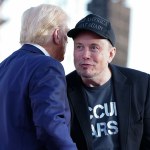Mauricio Pochettino began his tenure as United States men’s national team coach saying his players should aspire to achieve as much as the American women.
“We are here because we want to win,” he said Friday at his introductory news conference. “We have many examples next to us we need to follow.”
While the U.S. men haven’t reached the World Cup quarterfinals since 2002 and have never won the sport’s top tournament, the American women have won four World Cups and five Olympic gold medals.
“We need to believe we can win the World Cup,” he said.
Pochettino said his reasons for taking the reins as the manager of the U.S. men’s national team were “too many” to name, but when asked to distill them into one sentence, that was the one he settled: “We believe.”
“‘Believe’ for me, it’s a word that is so powerful,” Pochettino said. “You can have an enormous talent and you can be clever. In football, you need to believe that it’s possible. [If] we find the way together, I think for sure we’ll achieve.”
A 52-year-old Argentine, Pochettino will be coaching a national team for the first time, becoming the 10th U.S. coach in 14 years and its first foreign-born leader since Jurgen Klinsmann from 2011 to 2016. He was hired to replace Gregg Berhalter, who was fired from his second term on July 10, a week after the Americans were eliminated in the first round of the Copa América.
Emma Hayes, who coached at Chelsea before becoming the United States women’s team coach this year, helped recruit her former club colleague.
“I didn’t need to ask. She explained everything,” Pochettino said.
Wearing a dark jacket, a white dress shirt with no tie and a pocket square, Pochettino was flanked by U.S. Soccer Federation president Cindy Parlow Cone, CEO JT Batson and sporting director Matt Crocker, who knew Pochettino from their time together at Southampton a decade ago.
Longtime assistant Jesús Pérez was also in attendance. And whether Pochettino realized it or not, his thoughts echoed the cheer “I believe that we will win!” that is often heard at USMNT matches.
Re-creating that belief, which was once a staple of U.S. sides, will be a tall order. The team has struggled mightily of late, which included failing to get of the group stage at the Copa América. That has led to plenty of questions. Is the current, highly touted generation of players as good as was thought previously? Pochettino answered in the affirmative.
“I think we have very talented players,” Pochettino said. “I think of course the confidence was a little bit low after the Copa América. But we need to work into recovery. We have a very good professional not only in tactics or in physicality or in psychology. But we are going to work and to create the right pattern to follow, to get the confidence, to recover the confidence and start to perform together. But of course I think it’s a very good generation of players.”
In the wake of a disappointing September international window, one in which the U.S. lost to Canada on home soil for the first time in 67 years, as well as tied New Zealand, captain Christian Pulisic was among those saying that a cultural shift was needed. When asked about his thoughts on culture, Pochettino demurred.
But he did shed some light on the kind of atmosphere he hopes to foster.
“I think the most important [thing]is to create something special,” Pochettino said about the culture within the team. “To feel something when you going to the national team is not because the player come and [says], ‘Okay because they call me and we are going to play.’ No, we’re going to compete. And compete is completely different than you play and it’s [the] responsibility from the player and of course our responsibility to create the platform for them to perform.”
Pochettino added that his immediate priority is to get to know the players, which he’ll do regardless of whether they are playing in Europe, Liga MX or MLS. And while the 2026 World Cup — which the U.S. is co-hosting with Canada and Mexico — is on everyone’s mind, right now Pochettino is looking for improvement.
“That is a principal objective for us is to improve, provide a good platform for them to perform, to feel comfortable every time that they were joining us. And then for me, it’s not a friendly game for me, or it’s official. When I was player with Argentina, Copa América, World Cup or friendly all it was the same. To go and to show that you are the best and win the game for your country or crowd and everything because that means to be competitive.”
The moment capped of a whirlwind two months for Crocker, whose prior relationship with Pochettino from when the two were at Southampton proved critical. Bringing the Argentine on board is a coup for the USSF, and while it’s been over a decade since Crocker and Pochettino last worked together, Crocker insisted the Argentine hasn’t changed.
“I think you can spend a lot of time in the game at the top level and it can change some people in terms of the type of person they are,” Crocker said. “And I think Mauricio’s impact, when I was at Southampton many, many years ago when he came in with Jesús and his staff, the biggest thing that everybody remembers about Mauricio is not only is he a great coach, but he’s what I call a connector of people.
“So somebody that can build outstanding relationships, not just with the players who are starting, but the players who either not in the team, to the staff across the club from somebody that might work in the ticket office to somebody that might work within the administration team.”
Batson recalled the first meeting the USSF had with Pochettino in Barcelona. Given Pochettino’s reputation, the USSF was unsure how receptive he would be. What was supposed to be a two-hour meeting turned into five.
“It was clear from moment one that they were really interested and I think the relationship with Matt and their bond was very apparent from the moment we walked in the door and it just built and grew from there,” Batson said.
Cone called U.S: women’s team manager Emma Hayes — who crossed paths with Pochettino when the two were at Chelsea — “our secret recruiter” in that she could provide Pochettino with an insider’s view of working for the USSF.
“I think it helped Mauricio to have someone at the Federation that he could talk openly about the federation and figure out, ‘Are these people for real, right?’ Because we spent a lot of time with him and just being as open and honest and transparent about the good, the bad, the ugly of U.S. Soccer and what he was stepping into because we wanted, if he chose to come here, we wanted him to know exactly what he was getting into.”
Cone also noted that the deal wouldn’t have gotten done without the help of federation donors, including Kenneth Griffin and Scott Godwin.
“I think as a nonprofit, as a federation, sometimes we have to get a little creative,” she said. “And I’m just so thankful for everyone that stepped up and helped bring ‘Poch’ to our men’s national team.”
And by all appearances, Pochettino is pleased to be on board.
While some have proclaimed the current group the most talented the U.S. has produced, Pochettino was slightly more restrained in his assessment, calling it a “very good generation of players.”
“We need to show that we play like a collective on the pitch,” he said.
Pochettino arrived in the U.S. on Wednesday, a day after his deal was announced, and dined Thursday night with American soccer stakeholders.
His news conference — on Friday the 13th, for those who are superstitious — was in a Warner Bros. Discovery screening room at 30 Hudson Yards on the far west side of the Manhattan borough of New York City, just eight blocks from where Berhalter was introduced at Glasshouse Chelsea on Dec. 4, 2018.
Pochettino has led Espanyol in Spain (2009-12); Southampton (2013-14), Tottenham (2014-19) and Chelsea (2023-24) in England; and Paris Saint-Germain in France (2021-22), leaving after winning a Ligue 1 title.
Pochettino has 637 days before the Americans’ World Cup opener in Inglewood, California, on June 12, 2026. His first games will be friendlies against Panama on Oct. 12 at Austin, Texas, and at Mexico three days later, and his first competitive matches will be in a two-leg Concacaf Nations League quarterfinal in November.
Pochettino is likely to have his full player pool available for just eight one-week training periods before the team gathers ahead of the World Cup. The Americans are thin at goalkeeper and central defense and have had difficulty maintaining on-field discipline.
Information from The Associated Press was used in this report.






